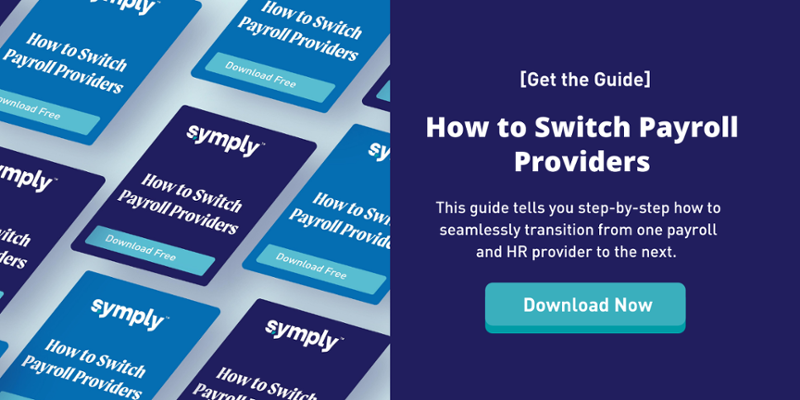HR News & Education
Check out the latest news and resources for small businesses covering topics such as human resources, employee engagement, and management.
7 Biggest Payroll Mistakes that Hurt a Small Business and How to Avoid Them

You don’t have to be a payroll expert to run a business, but there are some costly mistakes you want to avoid.
Over the years, we’ve seen small business owners overlook the same details when it comes to paying employees, depositing taxes, and maintaining records. And while it may not be the end of the world, it can certainly stall the growth of a new company.
That's why we compiled a list of the biggest payroll mistakes made by small business owners so you can avoid them.
Jump to section:
7) Failure to maintain records
1) Misclassifying employees
Classifying employees is one of the first steps of setting up payroll for a new business. Different laws and taxes apply to certain types of employees, and it’s very important to classify your employees properly.
Misclassifying employees can result in lawsuits and money owed to the government if you don’t catch it soon enough.
How to avoid it:
Take some time to educate yourself on the different types of employee classifications.
Regular vs. 1099
The first classification you should be familiar with is a regular employee vs. an independent contractor.
An employee who receives a W2 at the end of the year is a regular employee. You withhold and relay taxes on their behalf.
Someone who works for you but receives Form 1099 at the end of the year is not an employee. They are an independent contractor, and they are responsible for reporting and depositing their taxes.
The main factor determining whether someone is an employee or independent contractor is the degree of control you have over them as an employer. The IRS breaks this down into three categories; Behavioral, Financial, and Type of Relationship to evaluate the degree of control, but keep in mind that certain states have additional requirements for employee classification like California’s ABC test.
Exempt vs. non-exempt
An employee’s exempt status determines if they are eligible for overtime pay or not. Exempt employees are not eligible for overtime pay, whereas non-exempt employees are. There are laws to dictate how employees are classified, and it is your job to apply them properly.
The most obvious indicator for exempt status is compensation— the minimum salary for an exempt employee is $684 per week ($35,568 per year). Anyone making less than that will most likely be non-exempt.
The next and less straightforward indicator is the duties test. Under FSLA guidelines, certain employees must meet the minimum salary threshold and additional requirements to be exempt from overtime pay.
2) Processing payroll late
Processing payroll late is a classic mistake most employers make in their lifetime, but it can come at a high price. Not only does it affect your relationship with your employees, but many payroll services charge a fee to expedite payroll that can rack up quickly.
How to avoid it:
The primary causes of late payroll are due to improper planning and inefficient systems. There are specific days of the year that banks are closed that could affect your payroll schedule, and there are also ACH processing windows that determine when direct deposits are available. Having a reliable payroll calendar with these dates and windows outlined will prevent you from falling behind on your pay schedule.
3) Missing tax deadlines
All businesses are required to deposit employment taxes on a monthly or semi-weekly basis throughout the year. Late or incomplete deposits can leave you with a hefty fine from the IRS.
The IRS applies the Failure to Deposit Penalty to any employers that don’t make employment tax deposits:
- On-time
- In the right amount
- In the right way
The penalty amount is based on a percentage of the taxes you did not deposit and the number of calendar days you are late (and don’t forget the IRS charges interest on penalties!)
How to avoid it:
The best way to stay on top of your tax schedule is to monitor your deposit dates closely. You can use the payroll calendar we mentioned above to keep track of important payroll-related dates in one place.
4) Using the wrong tax rate
Tax rates change frequently, and paying the wrong rate could cause you to owe more money to the government after penalties and interest. Just remember, employment tax rates are not a set it and forget it type of deal— the rate you were paying when you hired your employees may not be the same rate today. If you use the wrong tax rate and underpay on your deposit, you will be subject to the Failure to Deposit Penalty mentioned above.
How to avoid it:
As a rule of thumb, you should monitor and update these rates every year:
- Federal income tax
- Social Security tax
- Medicare tax
- Federal unemployment tax
- State income tax
- State unemployment insurance tax
- Local income tax
5) Miscalculating pay
Underpaying or overpaying an employee isn’t as simple as an “I owe you.” Miscalculating a paycheck can quickly become a nightmare for you, your employee, and your bookkeeper. There may even be legal issues if it goes on long enough.
A common cause of miscalculating pay is entering the wrong number of hours worked or days off. And it’s especially common when you rely on your employees to communicate their schedule verbally.
Calculating pay gets really tricky when you are dealing with overtime. There are specific rates you are legally required to pay for hours worked over a certain amount of time. The federal law requires you to pay 1.5 times an employee’s regular wage for all hours worked over 40 in a workweek. Be sure to check your state laws because some states (like California) have additional overtime laws.
How to avoid it:
Have a crystal clear system for reporting hours, reviewing timesheets, or reviewing paychecks. It will help you catch any mistakes upfront before the payroll is processed. Some employers use a sign-off sheet for pre-processed checks or timesheets to share the responsibility with their employees and build trust.
6) Misprocessing Garnishments
Processing garnishments are not for the faint of heart. And the worst part about it is that you have no choice.
When an employee has a garnishment, they owe money to a third party by court order. As the employer, you are responsible for withholding the required amount from their paycheck and sending it to the right recipient.
How to avoid it:
Get professional help. Garnishments are extremely complex, even for payroll and tax professionals. If you don’t want to outsource your payroll completely, some modern payroll software platforms (Symply!) have sophisticated technology to guide you through garnishment calculations.
7) Failure to Maintain Records
The IRS legally requires you to keep payroll records for at least four years, but the Small Business Administration recommends keeping them for six. If the IRS decides to audit your business, you could face serious fines, penalties, and interest if employment documents aren’t easily accessible.
The same goes for independent contractors— you need to be able to demonstrate at any given moment that you paid your contractors and delivered their 1099s on time.
How to avoid it:
Use an online storage system or payroll software. Cloud storage is a small business owner’s dream when it comes to maintaining records over time. Do not rely on a paper filing system. The last thing you want is to be scrambling through filing cabinets with an auditor standing behind you. Dropbox is a great and affordable option for new business owners.
If you decide to use a payroll service, be sure to look for one that offers online self-service. This way, you can access all your reports and records when you need them instead of calling and requesting information from your service provider.

